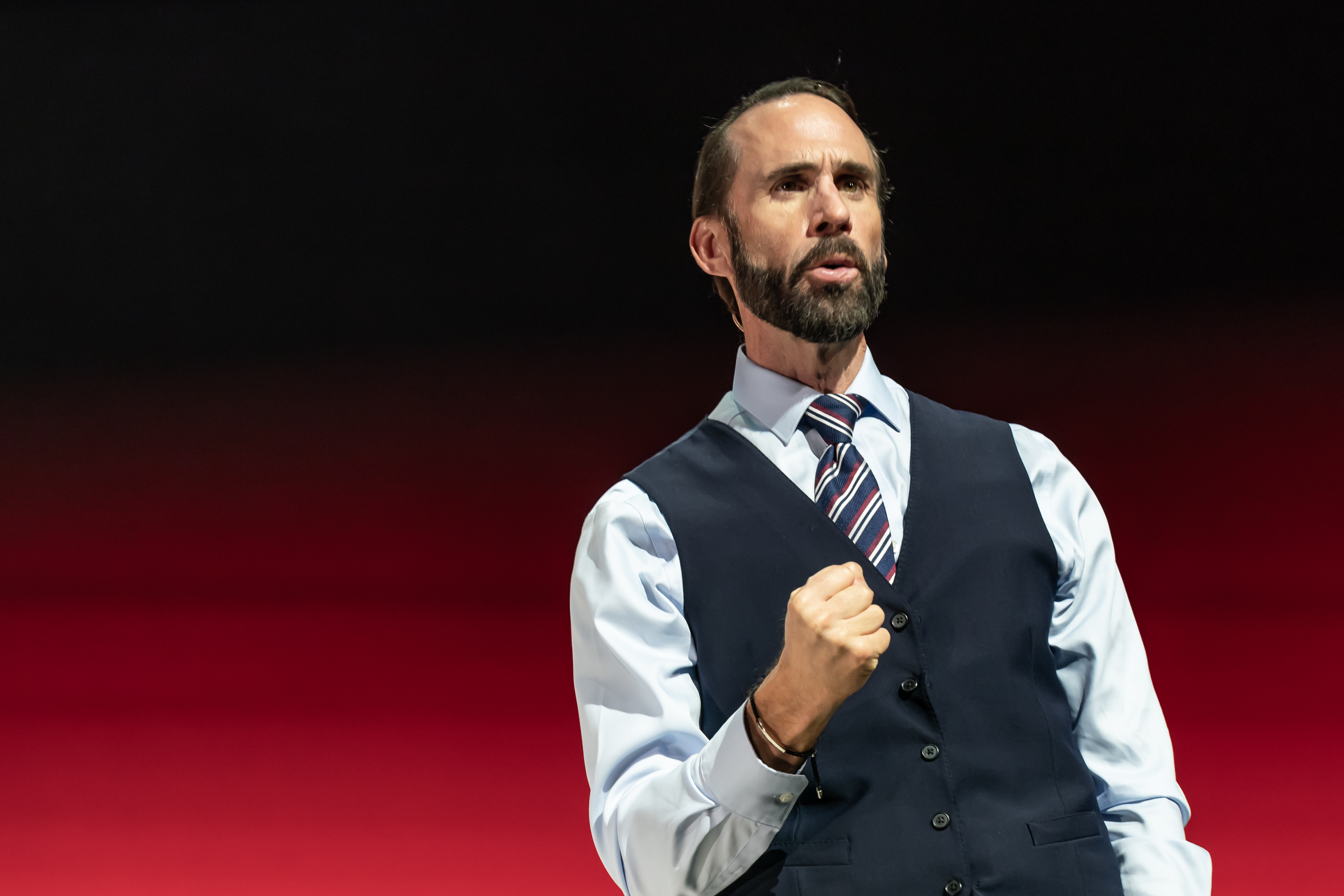Dear England – National Theatre / The Prince Edward Theatre, London
James Graham tells the story of Gareth Southgate’s England team in Dear England, an insightful play which also examines the place of individual, team and national psychology in sport and society.

Dear England
Dear England is a play about football. What do I know about football? Not a whole lot, really. But Dear England is also about a lot more than football. It’s about carrying the expectations of a country on your shoulders. It’s about doing the ‘impossible job’ (of which there is more than one). And it’s about being able to create the resilience, as a team and as individuals, to be OK even when you don’t win.
Dear England, by James Graham, began life at the National Theatre earlier this year. It’s now at the Prince Edward Theatre in Soho, with some actors having made the transfer and some new faces. Joseph Fiennes takes back up the mantle of England manager Gareth Southgate. Will Close, Josh Barrow and Darragh Hand return as, respectively, Harry Kane, Jordan Pickford and Marcus Rashford. But we have a new Bukayo Saka (Denzel Baidoo), Harry Maguire (Griffin Stevens) and Pippa Grange (Dervla Kirwan). A bit like transfers between football seasons? I’ll try to keep the football references to a minimum: not my forte.
Broadly speaking, the play follows the story to date of Gareth Southgate and his England team. Southgate, who took over the team after Sam Allardyce’s departure in 2016 (very funny renactment by Josh Hodgkinson as Allardyce), is famous for a couple of things. Waistcoats, for one. His unorthodox approach to managing a football team. And, of course, that penalty all the way back in 1996.

Sports Psychology
Can you imagine what it must be like? For a young person (and they are often so young) to have the nation’s eyes upon them: breath held, prayers ascending. If they make the penalty, they’re a hero. If they don’t, well… Southgate knows only too well what happens next. And he takes over a team who are hampered by fear. It holds them back from playing freely, from trusting each other implicitly as a team. The new manager’s approach is to incorporate psychology into training, to work on team culture as well as running drills and practices. Enter Pippa Grange, a psychologist who joins the team as Head of People and Team Development. Will this be the difference England has needed? Or is it woke nonsense, as the Matt Le Tissiers of the world would have it?
James Graham’s play is an insightful study of national identity, expectation, and performance under pressure. Whether its Southgate trying to bring a trophy home, Harry Kane at the penalty mark, or even Theresa May (Crystal Condie) attempting to deliver Brexit, scrutiny is the consistent factor. Scrutiny by the media, the nation, and the scrutiny of self as well. Some shake it off better than others.
This makes Dear England a play about football which doesn’t show a whole lot of football. The first half has a lot of exposition, and shows Southgate and the team doing the work to shed expectations and build trust. We go into the interval on a high, following England’s first win on penalties against Columbia in the 2018 World Cup. Southgate’s approach bearing fruit. But, just as Southgate told his young team, this is a long game. A three act story: an epic like an opera or a ballet (or Star Wars). So we go through the inevitable lows, as things seem to be unravelling. And the end, when it comes, is not silverware but something much more touching: a team who can lose together just as they win together; a different outcome for Harry Kane than for Gareth himself.

Staging Sport
That isn’t to say that the football isn’t done well in Dear England. There aren’t any balls, but sound design by Dan Balfour and Tom Gibbons brings the action to life as well as the roar of the crowd. Meanwhile Es Devlin‘s set flips easily from immersive stadium environment to changing room to the type of multimedia presentation we’re used to seeing in sports broadcasting. It reflects back the production’s energy, from highs to lows, and is a masterclass in simple yet effective design. Rupert Goold, directing, makes consistently good choices that keep the audience engaged and invested in the action (despite the fact that we all know what is in store for the team). And the talented cast make this a great ensemble piece regardless of the star casting.
I imagine it’s tricky, staging such contemporary history. We don’t just know these people, we see them week in and week out during the football season. A little different than the last thing I saw from the National Theatre, The Father and the Assassin: also real events, but with a few decades’ and continents’ remove. And there’s a fine line between faithfully representing a real person in all their mannerisms, and making a role yours. The Dear England cast do this well. Joseph Fiennes is recognisably Gareth Southgate: never the loudest man in the room, but driven and with a strong moral compass. Will Close does a good Harry Kane, as tittering from the audience attests. Nonetheless a particularly vulnerable scene between the two is the emotional climax of the evening. The resemblances are portrayed with a lot of love and warmth, for English football and its myriad of characters.
This is also a play which asks us to consider who we are as a nation. Sports teams are an excellent peg on which to hang a nation’s hopes and dreams, or even identity. Are we a nation which is gracious in defeat, or do we turn on those who are doing the impossible jobs for us? Dear England’s final message is one of hope: that although issues like racism in sport (and society) persist, we can come together to condemn them and help to shape the sort of team that we want to be. Our Dear England is in our hands.
Salterton Arts Review’s rating: 5/5
Dear England on until 13 January 2024
Trending
If you see this after your page is loaded completely, leafletJS files are missing.

